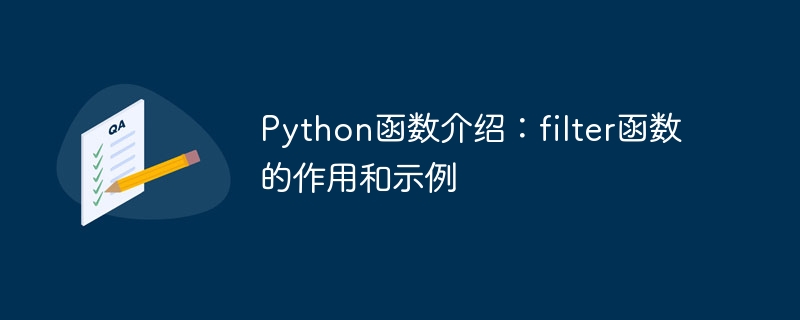

Introduction to Python functions: the role and examples of the filter function
Python is a powerful programming language that provides many built-in functions, one of which is filter function. The filter function is used to filter the elements in the list and return a new list composed of elements that meet the specified conditions. In this article, we will introduce what the filter function does and provide some examples to help readers understand its usage and potential.
The syntax of the filter function is as follows:
filter(function, iterable)
In the above syntax, function is a function and iterable is an iterable object, such as a list. The filter function passes each element in the iterable object to the function function and returns a new generator object containing the elements that satisfy the condition. If the return value of the function function is True, the element will be included in the new list; if the return value of the function function is False, the element will be filtered out.
Below we illustrate the usage of the filter function through a few simple examples.
Example 1:
Suppose we have a list containing numbers 1 to 10, and we want to filter out the even numbers. We can use the filter function to achieve this:
numbers = [1, 2, 3, 4, 5, 6, 7, 8, 9, 10]
def is_even(num):
return num % 2 == 0
even_numbers = list(filter(is_even, numbers))
print(even_numbers)Run the above code, the output result is: [2, 4, 6, 8, 10]. The filter function calls the is_even function to determine whether the element is an even number. Elements that meet the condition are included in the new list even_numbers.
Example 2:
Suppose we have a list of strings, and we want to filter out strings whose length is greater than or equal to 5. We can use the filter function to achieve this:
strings = ["apple", "banana", "cherry", "date", "elderberry", "fig", "grape"]
def is_long(string):
return len(string) >= 5
long_strings = list(filter(is_long, strings))
print(long_strings)Run the above code, the output result is: ['apple', 'banana', 'cherry', 'elderberry']. The filter function calls the is_long function to determine whether the length of the element is greater than or equal to 5. Elements that meet the condition are included in the new list long_strings.
Example 3:
The filter function also supports the use of lambda expressions to define filtering conditions, making the code more concise. The following example implements the same function as Example 1:
numbers = [1, 2, 3, 4, 5, 6, 7, 8, 9, 10] even_numbers = list(filter(lambda num: num % 2 == 0, numbers)) print(even_numbers)
Run the above code, the output result is: [2, 4, 6, 8, 10]. A lambda expression is used here to define the function is_even, which is passed as a parameter to the filter function.
Summary:
Through this article, we understand the role and examples of the filter function. The filter function provides a convenient way to filter elements in the list, allowing us to filter out the elements we need based on specific conditions. We can use custom functions or lambda expressions to define filter conditions. Understanding and mastering the usage of the filter function is very useful for processing list data. I hope this article can help readers deepen their understanding and application capabilities of the filter function.
The above is the detailed content of Introduction to Python functions: functions and examples of filter functions. For more information, please follow other related articles on the PHP Chinese website!




